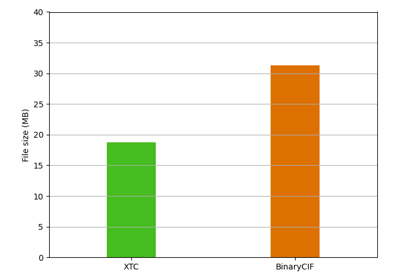biotite.structure.io.pdbx.BinaryCIFBlock¶
- class biotite.structure.io.pdbx.BinaryCIFBlock(categories=None)[source]¶
Bases:
_HierarchicalContainerThis class represents a block in a
BinaryCIFFile.Categories can be accessed and modified like a dictionary. The values are
BinaryCIFCategoryobjects.- Parameters
- categoriesdict, optional
The categories of the block. The keys are the category names and the values are the
BinaryCIFCategoryobjects. By default, an empty block is created.
Notes
The category names do not include the leading underscore character. This character is automatically added when the category is serialized.
Examples
>>> # Add category on creation >>> block = BinaryCIFBlock({"foo": BinaryCIFCategory({"some_column": 1})}) >>> # Add category later on >>> block["bar"] = BinaryCIFCategory({"another_column": [2, 3]}) >>> # Access a column >>> print(block["bar"]["another_column"].as_array()) [2 3]
- clear() None. Remove all items from D.¶
- static deserialize(content)¶
Create this component by deserializing the given content.
- Parameters
- contentstr or dict
The content to be deserialized. The type of this parameter depends on the file format. In case of CIF files, this is the text of the lines that represent this component. In case of BinaryCIF files, this is a dictionary parsed from the MessagePack data.
- get(k[, d]) D[k] if k in D, else d. d defaults to None.¶
- items() a set-like object providing a view on D's items¶
- keys() a set-like object providing a view on D's keys¶
- pop(k[, d]) v, remove specified key and return the corresponding value.¶
If key is not found, d is returned if given, otherwise KeyError is raised.
- popitem() (k, v), remove and return some (key, value) pair¶
as a 2-tuple; but raise KeyError if D is empty.
- serialize()¶
Convert this component into a Python object that can be written to a file.
- Returns
- contentstr or dict
The content to be serialized. The type of this return value depends on the file format. In case of CIF files, this is the text of the lines that represent this component. In case of BinaryCIF files, this is a dictionary that can be encoded into MessagePack.
- setdefault(k[, d]) D.get(k,d), also set D[k]=d if k not in D¶
- static subcomponent_class()¶
Get the class of the components that are stored in this component.
- Returns
- subcomponent_classtype
The class of the subcomponent. If this component already represents the lowest level, i.e. it does not contain subcomponents,
Noneis returned.
- static supercomponent_class()¶
Get the class of the component that contains this component.
- Returns
- supercomponent_classtype
The class of the supercomponent. If this component present already the highest level, i.e. it is not contained in another component,
Noneis returned.
- update([E, ]**F) None. Update D from mapping/iterable E and F.¶
If E present and has a .keys() method, does: for k in E: D[k] = E[k] If E present and lacks .keys() method, does: for (k, v) in E: D[k] = v In either case, this is followed by: for k, v in F.items(): D[k] = v
- values() an object providing a view on D's values¶


